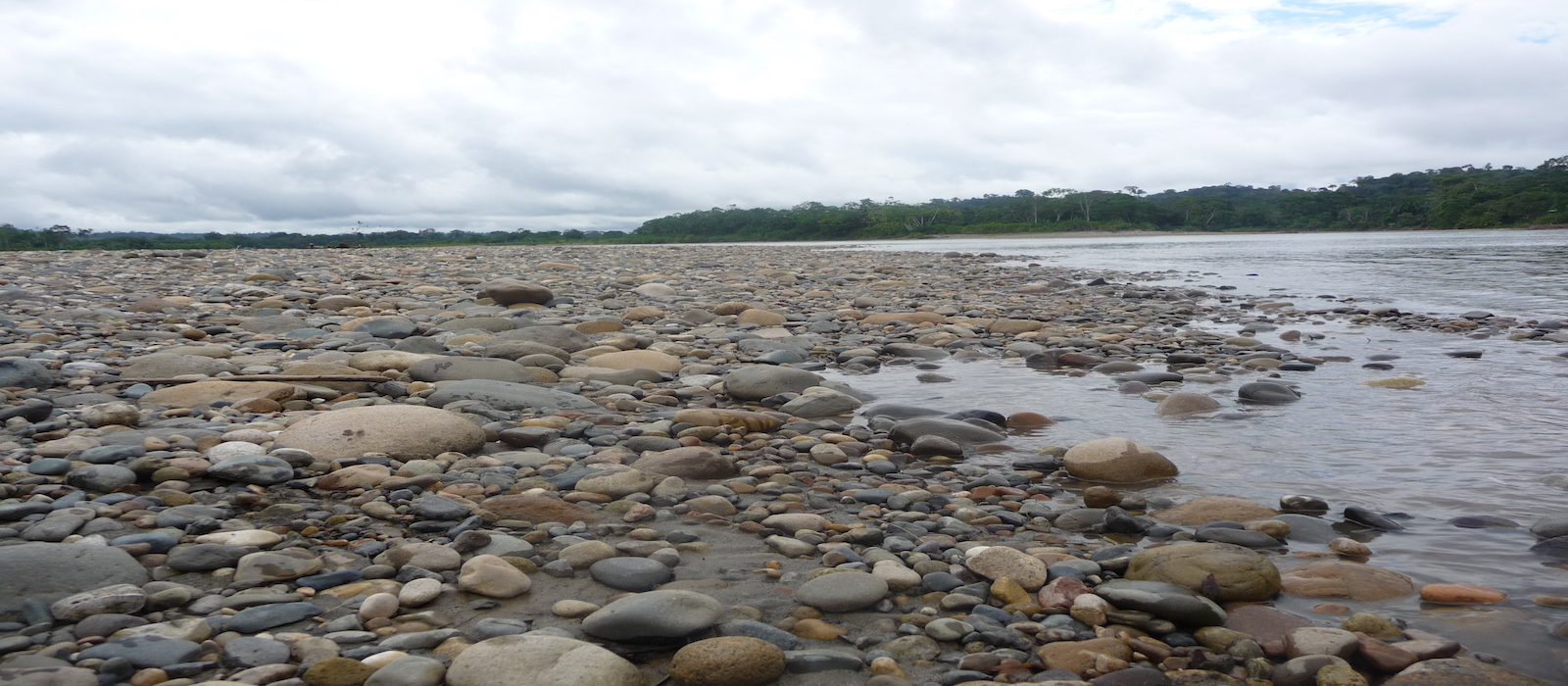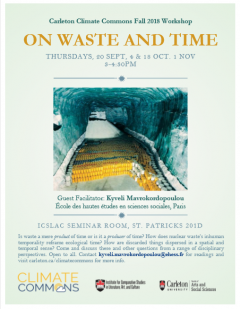Carbon Pricing: Risks and Rewards
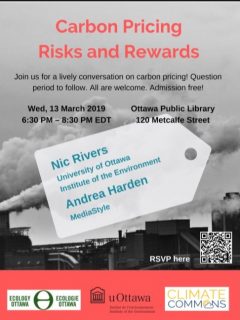
March 13, 2019
Ottawa Public Library 120 Metcalfe Street 6:30p.m.-8:30p.m.
Please join speakers Nic Rivers (University of Ottawa’s Institute of the Environment) and Andrea Harden (MediaStyle) for an approachable discussion about how carbon pricing works, how it can be pitched to various audiences, and how it fits into the larger network of climate solutions. Followed by audience Q&A
For more information on the speakers visit Upcoming Carbon Pricing Event
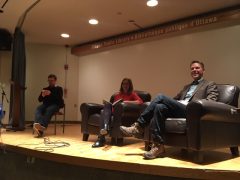
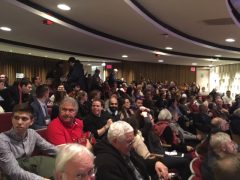
On the Sea Ice, We Wear White: Stories of Inuit Grief and Joy
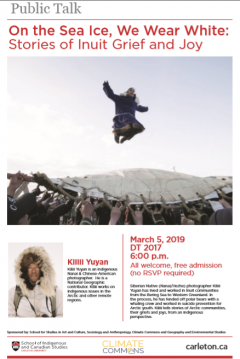 March 5, 2019
March 5, 2019
Carleton University 2017 Dunton Tower 6:00p.m.
Siberian Native (Nanai/Hezhe) photographer Kiliii Yuyan has lived and worked in Inuit communities from the Bering Sea to Western Greenland. In the process, he has fended off polar bears with a whaling crew and worked in suicide prevention for Arctic youth. Kiliii tells stories of Arctic communities, their griefs and joys, from an indigenous perspective.
Comics, Climate, and Canada’s Energy Future
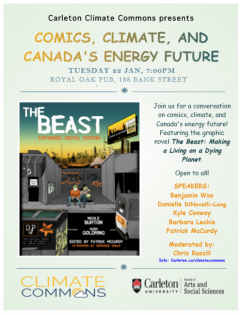
January 22, 2019
Royal Oak Pub, 188 Bank Street 7:00p.m.
Join us for a conversation on comics, climate, and Canada’s energy future! Featuring the graphic novel The Beast: Making a Living on a Dying Planet. Open to all!
Moderated by:
Chris Russill
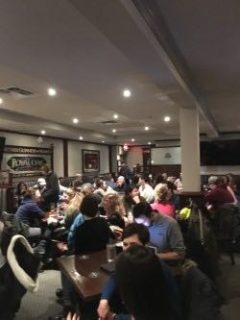
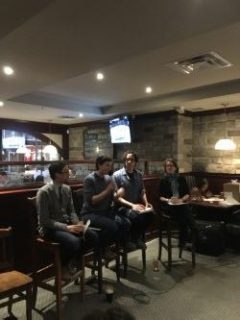
Speakers:
- Benjamin Woo
- Danielle DiNovelli-Long
- Kyle Conway
- Barbara Leckie
- Patrick McCurdy
For more information visit: carleton.ca/climatecommons
4th Annual Institute of African Studies Undergraduate Conference on Climate Change, the Environment, and Afrofuturism
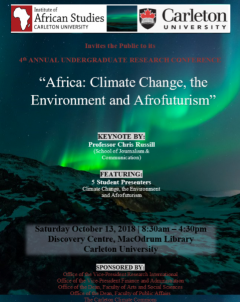 October 13, 2018
October 13, 2018
Carleton University Discovery Centre MacOdrum Library 8:30a.m. – 4:00p.m.
The Keynote Address will be delivered by Chris Russill. Poster attached and more details here: https://carleton.ca/africanstudies/4th-annual-undergraduate-research-conference-africa-climate-change-the-environment-and-afrofuturism/.
How climate change may (or may not) impact behavior of farmers
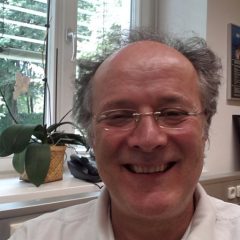 September 27, 2018
September 27, 2018
Carleton University 4400 Richcraft Hall 12:00p.m. – 1:30p.m.
Paul will be delivering a lunch time talk on climate change, farming, and science and risk communication, titled: How climate change may (or may not) impact behavior of farmers.
Paul received his PhD in plant physiology from Cambridge University. After 2 postdocs (the second being at the Experimental Farm in Ottawa) he had the opportunity to start a research group in plant molecular biology at a Max Planck Institute in Germany. For the next 15 years researched how stress can influence cell division and differentiation in plants. Because of his growing interest in science and risk communication, he then changed fields completely to start a new career as a social scientist at the Institute of Communication and Media Research at the Ludwig Maximilians University in Munich. His is currently coordinating a project looking at how climate change impacts the behavior of farming communities in Tunisia and Chile. That is also the topic of his lunch talk.
Please contact irena.knezevic@carleton.ca with any questions.
Carleton Climate Commons Fall 2018 Workshop: On Waste and Time
September 20, October 4 & 18, and November 1, 2018
Carleton University Icslac Seminar Room, 201D St. Patricks Building 3:00p.m. – 4:30 p.m.
Guest Facilitator: Kyveli Mavrokordopoulou (École des hautes études en sciences sociales, Paris)
More info on facilitator: Interview with Visiting Scholar Kyveli Mavrokordopoulou
Waste never really disappears. Waste accumulates and persists in the environment and as a result, introduces complex temporalities. In industrial societies of mass consumption, different types of waste are produced on a daily basis, and demand extended storage or disposal solutions. In this regard, it stands among the major environmental concerns of our time that confront humans with inhuman and non-human factors, by its temporality, non-locality and evasive nature. Scientific research around waste management may attempt to find definitive solutions (e.g. deep geological disposals for nuclear waste), but some types of waste resist any solution, and fail to be contained, determinate, or calculable (Hird, 2012).
Even though waste is construed as a material testimony from the past, at the same time, it projects us into the (deep) future, and hence poses additional questions: is waste a mere product of time or is it a producer of time? How does, for instance, nuclear waste’s inhuman temporality reframe ecological time? More generally, how are discarded things dispersed in a spatial and temporal sense? Departing from Mary Douglas’s influential theorisation of waste as ‘‘matter out of place’’ in Purity and Danger (1966), this workshop fleshes out questions around waste’s temporal natures through more recent scholarship; we will reread Douglas’s position through authors that stress the intricate entanglements of waste’s materiality and temporality for a future-oriented environmental thought.
Each session will last 1.5 hours: the first part will be devoted to the reading material. Throughout the second part, we hope to confront theory with case studies from the literature, the arts and politics. We highly encourage participants to bring examples to the table that could be relevant to the questions discussed and could operate as an impulse for the collective discussion as well as an opportunity to share research (although this is not a prerequisite for participation to the group).
The group will be accompanied by the screening of Containment (2015), a documentary on the legacy of Cold War nuclear waste by Peter Galison and Robb Moss.
Organised by Kyveli Mavrokordopoulou, École des hautes études en sciences sociales, Paris
For access to the reading materials please contact: kyveli.mavrokordopoulou@ehess.fr
For more information on the different sessions visit:
- CCC Workshop: First Session September 20, 2018
- Hird, M. J. (2013). Waste, Landfills, and an Environmental Ethic of Vulnerability. Ethics and the Environment, 18(1), 105-124.
- (2016). The Phenomenon of Waste-World-Making. Rhizomes: Cultural Studies in Emerging Knowledge, 30, 1-8.
- CCC Workshop: Second Session October 4, 2018
- Viney, W. (2014). Waste: A Philosophy of Things. London, New York: Bloomsbury. (selection to be determined)
- CCC Workshop: Third Session October 18, 2018
- Reno, J. O. (2016). Waste Away: Working and Living with a North American Landfill. Oakland: UP California. (selection to be determined)
- CCC Workshop: Fourth Session November 1, 2018
- Hecht, G. (2018). Interscalar Vehicles for an African Anthropocene: On Waste, Temporality, and Violence. Cultural Anthropology, 33(1), 109-141. https://doi.org/10.14506/ca33.1.05
Carleton Climate Commons Reading Group
 December 2017 to April 2018
December 2017 to April 2018
A reading group dedicated to pursuing the contribution the Humanities can make to our current climate change crisis. All are welcome!
Tuesday, December 12, 2017
- In our first meeting we view together a short video by Richard Mosse and a longer lecture by Bruno Latour. The remaining hour will be dedicated to discussion. (There will be no reading.)
- View Bruno Latour’s lecture, “On Sensitivity Arts, Science and Politics, in the New Climatic Regime” (45 mins): http://www.bruno-latour.fr/node/692
- View Richard Mosse’s “artist’s statement” (14 mins): http://www.richardmosse.com/projects/artist-statement
Tuesday January 16, 2018
- Read Latour’s “First Lecture: On the Instability of the (notion of) Nature” (focus on pp. 7-28)
- View Louis Helbig’s “Beautiful Destruction”: http://beautifuldestruction.ca/beautiful-destruction-gallery/
Tuesday, February 13, 2018
- Our next series of meetings will focus on essays from Anna Tsing et al.’s
- Arts of Living on a Damaged Planet (https://www.upress.umn.edu/book-division/books/arts-of-living-on-a-damaged-planet)
- Read “Introduction: Bodies Tumbled into Bodies”
- Read “Introduction: Haunted Landscapes of the Anthropocene”
- Arts of Living on a Damaged Planet (https://www.upress.umn.edu/book-division/books/arts-of-living-on-a-damaged-planet)
Tuesday, March 13, 2018
- Read Donna Haraway’s “Symbiogenesis, Sympoiesis, and Art Science Activisms for Staying with the Trouble”
Tuesday, April 10, 2019
- Readings/ viewings TBD
ICSLAC Talks & The Production of Literature Lecture Series Present: Nathan Hensley, Georgetown University
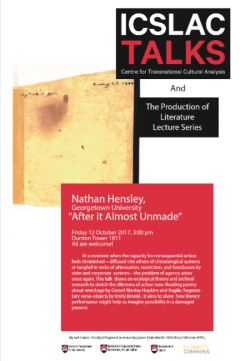 October 13, 2017
October 13, 2017
Carleton University 1811 Dunton Tower 3:00p.m.
Title: “After it Almost Unmade”
Paper Abstract:
At a moment when the capacity for consequential action feels diminishes – diffused into ethers of climatological systems or tangles in webs of attenuation, restriction, and foreclosure by state and corporate systems – the problem of agency arises once again. This talk draws on ecological theory and archival research to sketch the dilemma of action now. Reading poetry about wreckage by Gerard Manley Hopkins and fragile, fragmentary verse-objects by Emily Brontë, it aims to show how literary performance might help us imagine possibility in a damaged present.
Sponsored by ICSLAC, the Department of English, and the Carleton Climate Commons
Climate Café: Trudeau, Trump, Political In/Action, and Alternative Forms of Political Mobilization
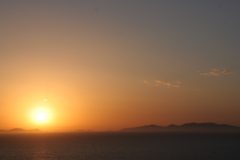
April 5, 2017
Given the political climate in North America, how can climate activists move forward, what might be some effective strategies, and where should we put our energy? What is the role of politics with respect to climate change action? What differences do we see between the US and Canada? In the absence of forceful action, what alternative approaches can we explore? What other forms of political mobilization are available.
Speakers Include:
• Robb Barnes (Ecology Ottawa)
• Danielle DiNovelli-Lang (Sociology and Anthropology, Carleton University)
• Ben Powless (Canadian Centre for Policy Alternatives)
• Hadrian Mertins-Kirkwood (Canadian Centre for Policy Alternatives)
• Rolly Montpellier (350 Ottawa)
Moderated by:
- Justin Paulson (Sociology and Anthropology, Carleton University)
“Global Warming Hoaxsters”: The Rising Cost of the Environment
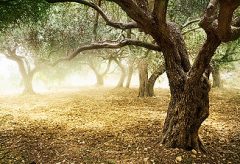 March 21, 2017
March 21, 2017
“Any and all weather events are used by the GLOBAL WARMING HOAXSTERS to justify higher taxes to save our planet! They don’t believe it $$$$!” – Trump
“A Trump administration will focus on real environmental challenges, not phony ones: We will reject Hillary Clinton’s poverty-expansion agenda that enriches her friends and makes everyone else poor. We’ll solve real environmental problems in our communities like the need for clean and safe drinking water.” – Trump
These tweets from notorious climate change denier, Donald Trump, speak to a growing opposition between the environment and the economy. This opposition extends to recent news articles on the effects of climate change, ranging from catastrophic natural disasters to rising taxes. Climate change poses an imminent threat to the survival of the planet, while sustainable development threatens our (economic) survival. We invite you to a discussion that considers the ways in which the environment is pitted against the economy.
Questions to consider:
- Is it possible to reconcile these seemingly opposing topics (environment vs economy)?
- How do we distinguish between “real” and “phony” environmental challenges?
- What are some alternatives to imposing a tax? Is money the only motivator to get people thinking conscientiously about the environment?
- What do we mean by the “environment”?
The Same River Twice: Nature, Media, and Philosophy in the Anthropocene
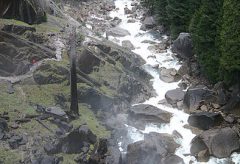 April 12, 2017
April 12, 2017
Dr. Etienne Turpin
Carleton University
132 Azrieli Pavilion
April 12, 3-4:30pm
Climate Café: Climate Change and Migration
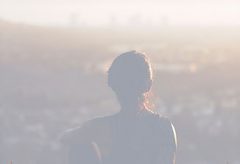
Wednesday, March 1st, 2017, 7pm
Heart & Crown, Preston Street
Join us for an evening of conversation, learning and debate as we explore the relationship between climate change, refugees, and migration in our community and elsewhere.
Speakers Include:
- Nadia Abu-Zahra (International Development and Global Studies, University of Ottawa)
- Jay Drydyk (Philosophy, Carleton University)
- Sergio Guerra (Spoken Word Artist and Community Organizer)
- Franny Nudelman (English, Carleton University)
- Daniel McNeil (History & Migration and Diaspora Studies, Carleton University)
- Jay Ramasubramanyam (Law and Legal Studies, Carleton University)
- Chris Russill (Journalism and Communication, Carleton University)
Moderated by:
- Justin Paulson (Sociology and Anthropology, Carleton University)
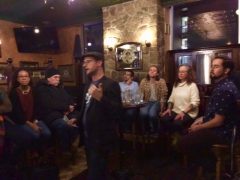
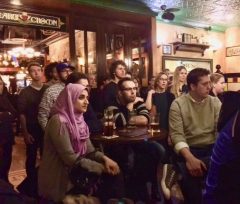
Global Economic and Climate Change along the Silk Road: Crisis in Central Asia and Afghanistan
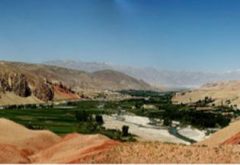 April 12, 2016
April 12, 2016
Join the Aga Khan Foundation Canada and Carleton University for a panel discussion on the future of Central Asia and Afghanistan. Speakers will bring insights informed by decades of experience in the fields of economic development, public policy, and climate change. In addition Dr Bohdan Krawchenko and Dr Dietrich Schmidt-Vogt from the University of Central Asia will reflect on lessons learned from the UCA’s Research and Public Policy Initiative, funded by Canada’s International Development Research Centre and AKFC, which sought to strengthen research capacity and evidence-based policy-making in Afghanistan and Central Asia.
Date: Tuesday, April 12, 2016
Time: 1:00 – 4:00PM
Location: Carleton University, River Building Room 2228
Workshop on Climate change, the Curriculum, and the University
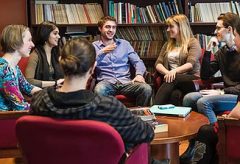 April 06, 2016
April 06, 2016
Participants at last December’s roundtable on climate change and the curriculum discussed two key spaces of pedagogical intervention: the classroom and the university itself. Join us on Wednesday, April 6th, for a follow-up workshop where we will collectively identify concrete interventions that Carleton faculty members can make in each of these two spaces. The questions we will seek to address include:
- What challenges do we face when trying to interest students in questions of climate change?
- What strategies can we adopt to overcome such challenges?
- What themes, case studies, reading lists, assignments, and research projects are most promising or have been successfully used by our faculty members?
- How do we take advantage of the fact that learning also happens beyond the confines of our classrooms?
- If the university is a repository of many kinds of material, financial and social resources that can help us effectively incorporate climate change in the curriculum, how do we find out what those resources are (or should be) and how to access them?
Moderators: Pablo Mendez (DGES), Franny Nudelman (English)
Winter 2016 Documentary Film Series: This Changes Everything
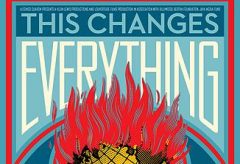 April 20, 2016
April 20, 2016
“Interwoven with these stories of struggle is Klein’s narration, connecting the carbon in the air with the economic system that put it there. Throughout the film, Klein builds to her most controversial and exciting idea: that we can seize the existential crisis of climate change to transform our failed economic system into something radically better.”
At 7:30 PM in the Discovery Centre (4th floor, MacOdrum Library) on April 20th come enjoy, think, and talk about THIS CHANGES EVERYTHING.
Winter 2016 Documentary Film Series: Oil Sands Karaoke
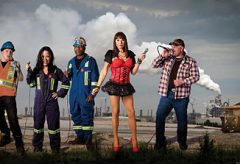 March 31, 2016
March 31, 2016
Oil Sands Karaoke “follows five people working in or around the infamous oil sands of Northern Alberta as they compete in a karaoke contest held at local watering hole Bailey’s Pub.”
At 7:30 PM in the Discovery Centre (4th floor, MacOdrum Library) on March 31st come enjoy, think, and talk about OIL SANDS KARAOKE. This event is completely FREE!
Winter 2016 Documentary Film Series: Inuit Knowledge and Climate Change
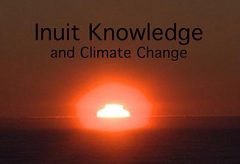 March 03, 2016
March 03, 2016
“…the world’s first Inuktitut language film on the topic, [Inuit Knowledge and Climate Change] takes the viewer “on the land” with elders and hunters to explore the social and ecological impacts of a warming Arctic.”
At 7:30 PM in the Discovery Centre (4th floor, MacOdrum Library) on March 3rd come enjoy, think, and talk about INUIT KNOWLEDGE AND CLIMATE CHANGE.
Food Polititcs Round Table
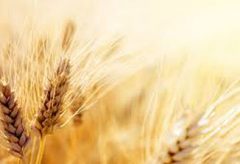 March 17, 2016
March 17, 2016
Panelists: Andrew Spring (Wilfrid Laurier University), Leah Temper (Seeds of Survival, USC Canada) and Sonia Wesche (University of Ottawa)
Respondents: Peter Andree (Carleton University) and Jane Skapinker (Carleton University Dining Services)
Time: 3:00-5:00pm. Where: Dunton Tower, Ottawa, ON, Canada, Room 2017
Moderated by Irena Knezevic.
Reading Group: Rhetoric, Narrative, Language
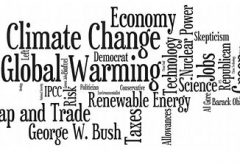 April 30, 2016
April 30, 2016
Upcoming event, check back soon for more details!
This reading group will focus on readings in climate change discourse. A list of potential readings will be circulated before the first meeting and the readings will be determined by the group as a whole. If you would like to make suggestions for the reading list or join the group please contact: Barbara Leckie.
Fall 2015 Documentary Film Series: Chasing Ice
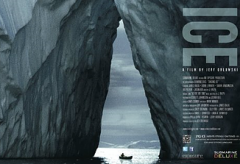 December 10, 2015
December 10, 2015
“Chasing Ice is the story of one man’s mission to change the tide of history by gathering undeniable evidence of our changing planet.”
At 7:30 PM in the Discovery Centre (4th floor, MacOdrum Library) on December 10th come enjoy, think, and talk about CHASING ICE. This event is completely FREE!
This event will be moderated by Lisa Glithero (Faculty of Education, University of Ottawa)
Fall 2015 Documentary Film Series: Surviving Progress
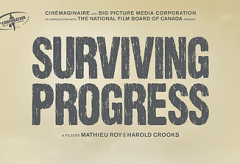 November 19, 2015
November 19, 2015
“Humanity’s ascent is often measured by the speed of progress. But what if progress is actually spiraling us downwards, towards collapse?”
At 7:30 PM in the Discovery Centre (4th floor, MacOdrum Library) on November 19th come enjoy, think, and talk about SURVING PROGRESS. This event is completely FREE!
This event will be moderated by Alan Nymark (Film Studies – School for Studies in Art and Culture)
Fall 2015 Documentary Film Series: Watermark
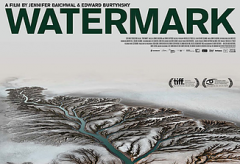 October 20, 2015
October 20, 2015
“WATERMARK … brings together diverse stories from around the globe about our relationship with water: how we are drawn to it, what we learn from it, how we use it and the consequences of that use.”
At 7:30 PM in the Discovery Centre (4th floor, MacOdrum Library) on October 20th come enjoy, think, and talk about WATERMARK. This event will be moderated by Peter Thompson (School of Canadian Studies)
Naomi Klein Reading Group
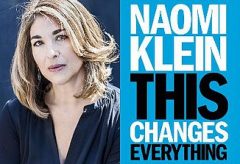 March 12, 2015
March 12, 2015
A reading group to discuss short selections from Naomi Klein’s new book This Changes Everything.
Perspectives on Fossil Fuel Divestment: A Roundtble
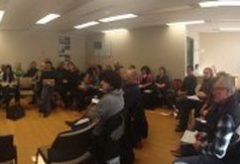
March 05, 2015
Pipeline Information Session
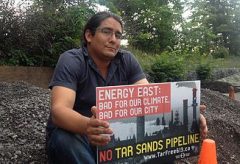
Ben Powless, a pipeline community organizer with Ecology Ottawa, spoke at Thursday nights public information session to gather support for the organizations advocacy efforts to oppose the Energy East pipeline
February 12, 2015
Guest speaker Ben Powless, from Ecology Ottawa, breaks down the Energy East pipeline and its adverse affects on the environment.
